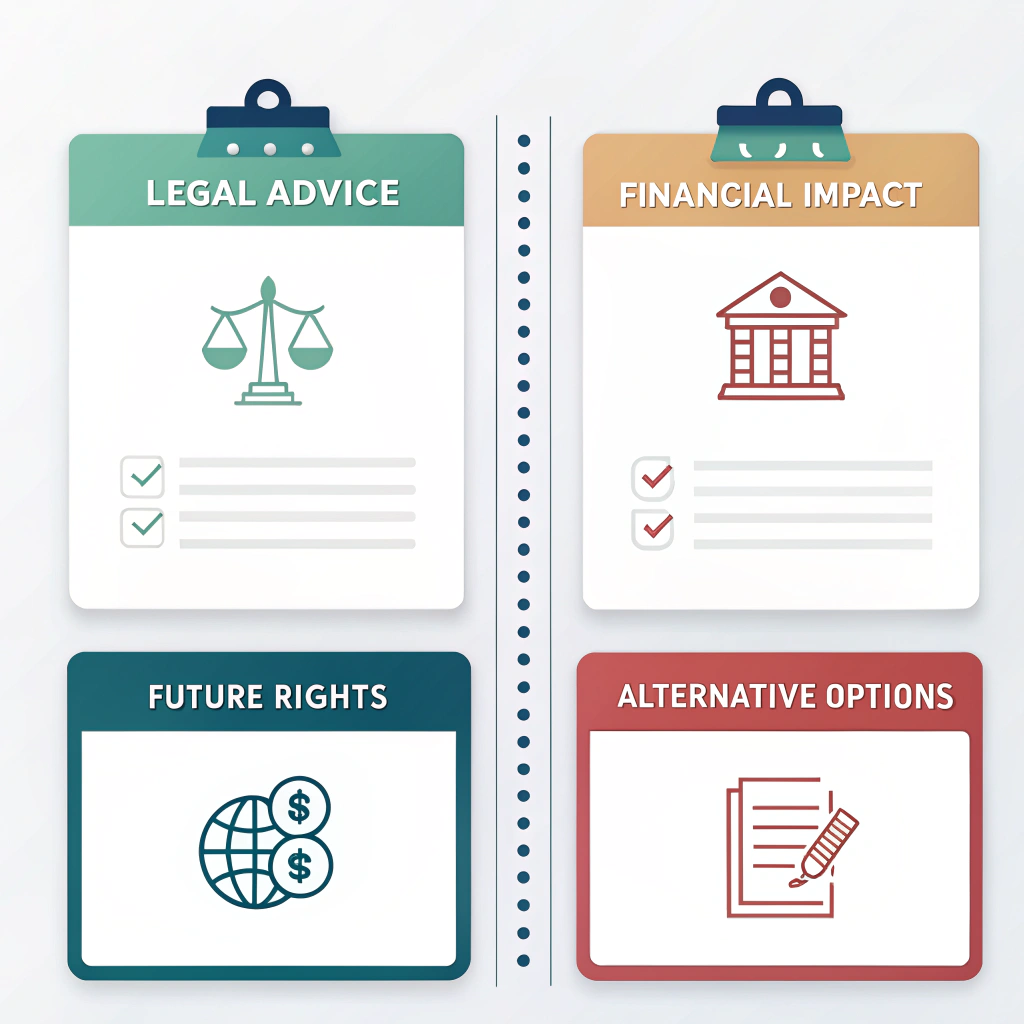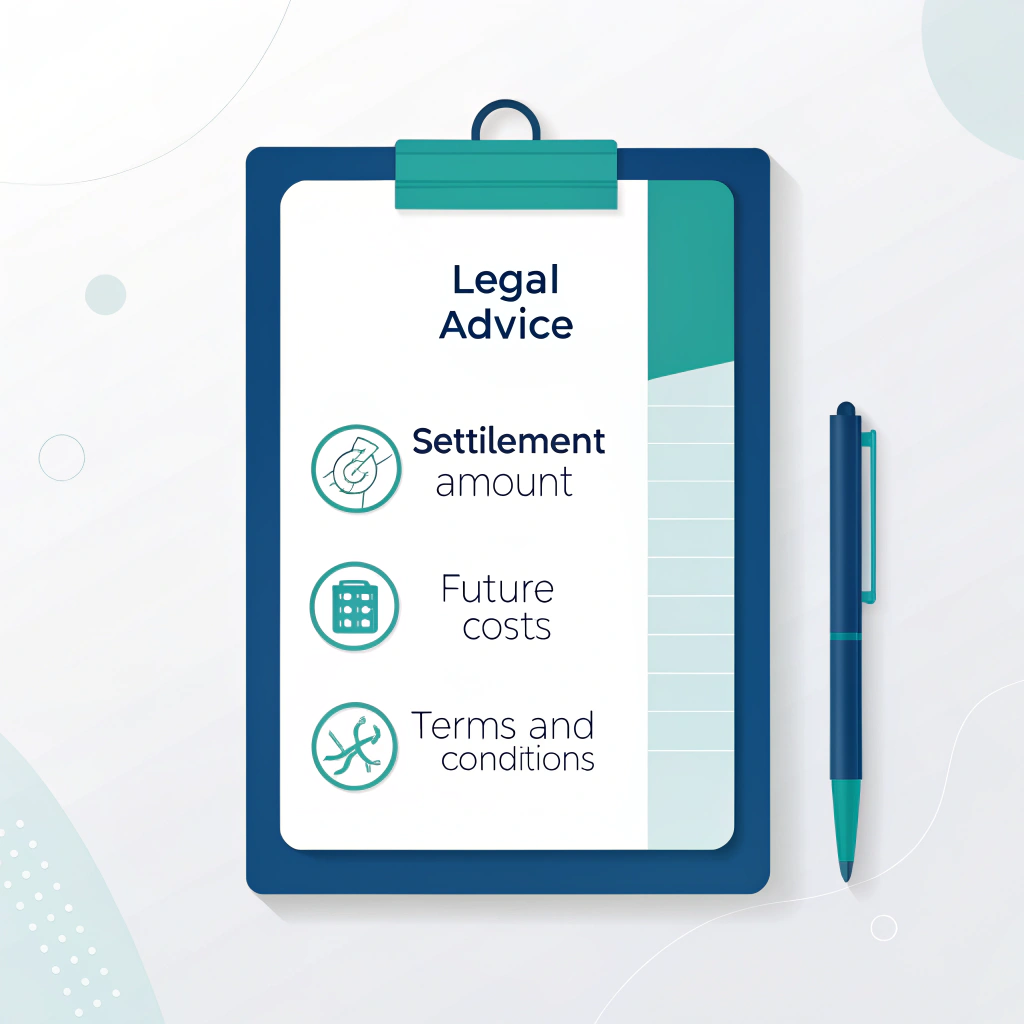
4 Things You Need to Consider Before Accepting a Settlement Offer
“Pause, Review, Negotiate, Decide: Your Checklist Before Saying ‘Yes’ to a Settlement.”
Before accepting a settlement offer, it’s crucial to consider several factors to ensure you’re making the best decision for your situation. Here are four key things to contemplate:
1. **Adequacy of the Offer**: Evaluate if the settlement amount is sufficient to cover all your damages, including medical expenses, lost wages, pain and suffering, and any future costs related to your injury or loss. Once you accept an offer, you typically cannot ask for more money later, so it’s important to ensure the offer is adequate.
2. **Liability**: Consider who is at fault and if the settlement offer reflects the degree of liability. If you believe the other party is more at fault than the offer indicates, you might want to negotiate further or consider taking the case to trial.
3. **Finality**: Accepting a settlement offer is usually final. This means you give up your right to sue the other party again for the same issue. Make sure you’re comfortable with this finality before accepting.
4. **Legal Advice**: It’s highly recommended to consult with a lawyer before accepting a settlement offer. An attorney can provide valuable insights, help you understand the legal implications, and negotiate on your behalf if necessary.
Understanding the Full Value of Your Claim
Before accepting a settlement offer, it’s crucial to understand the full value of your claim. This process involves evaluating several factors to ensure you’re making an informed decision. Firstly, consider the extent of your damages. This includes not only medical expenses and property damage but also lost wages, pain and suffering, and any long-term impacts on your quality of life. It’s important to have a comprehensive understanding of these costs, as accepting a settlement offer typically means forfeiting your right to pursue further legal action.
Moreover, it’s essential to consider the strength of your case. If you have substantial evidence supporting your claim, you may be in a strong position to negotiate a higher settlement. Conversely, if the evidence is weak or the liability is unclear, you might need to adjust your expectations accordingly. Transitioning from this point, the timing of the settlement offer is also a critical factor. Insurance companies often make initial offers that are lower than what your claim may truly be worth. They may try to settle quickly to minimize their costs, so be cautious of accepting the first offer without careful consideration.
Additionally, consider the potential risks and benefits of going to trial versus accepting the settlement. While a trial could potentially yield a higher compensation, it also comes with risks, such as the possibility of losing the case or incurring additional legal fees. Conversely, accepting a settlement offer provides a guaranteed outcome and can save time and stress. To navigate these complexities, it’s advisable to consult with a legal professional. An experienced attorney can provide valuable insights into the strengths and weaknesses of your case, help you understand the full value of your claim, and negotiate on your behalf to ensure you receive a fair settlement.
Lastly, consider the long-term implications of accepting the settlement offer. Once you accept a settlement, you typically cannot reopen the case or seek additional compensation, even if your injuries or damages turn out to be more severe than initially thought. Therefore, it’s vital to ensure that the settlement offer adequately covers all potential future costs related to your claim. In conclusion, before accepting a settlement offer, carefully evaluate the extent of your damages, the strength of your case, the timing of the offer, and the long-term implications. By understanding the full value of your claim and consulting with a legal professional, you can make an informed decision that best serves your interests.
The Impact of Accepting a Settlement on Future Medical Needs

When involved in a personal injury case, you may receive a settlement offer from the opposing party. Before accepting, it’s crucial to consider several factors, one of the most significant being the impact on your future medical needs.
Firstly, consider that accepting a settlement offer typically means signing a release form. This form absolves the opposing party from any further liability related to your injury. In essence, you agree that the settlement amount will fully compensate you for all past, present, and future damages. Consequently, even if your medical condition worsens or you incur unexpected medical expenses in the future, you cannot seek additional compensation from the at-fault party. Therefore, it is vital to have a clear understanding of your future medical needs before accepting any offer.
Moreover, it is prudent to consult with your healthcare providers to anticipate your future medical needs. Discuss your prognosis, the likelihood of needing further treatment or surgeries, and the cost of ongoing care. This could include expenses for medication, physical therapy, or assistive devices. Having a clear picture of your future medical needs will help you evaluate if the settlement offer is adequate. Remember, once you accept an offer, there’s no turning back. Hence, it’s better to err on the side of caution and ensure your bases are covered.
Additionally, consider the potential long-term effects of your injury. Some injuries, especially those that are severe or catastrophic, can have lifelong consequences. They may impair your ability to work or enjoy life as you once did. In such cases, you may need to consider the cost of long-term care, home modifications, or vocational rehabilitation. These costs can add up significantly over time, and a settlement offer should account for these potential expenses. It’s essential to think not just about your immediate needs, but also about how your injury might impact your life five, ten, or even twenty years down the line.
Furthermore, if you’re receiving or expect to receive future medical benefits, such as Medicare or Medicaid, consider how a settlement might affect these benefits. Federal law requires that Medicare’s interests be protected in personal injury settlements. This means that a portion of your settlement may need to be set aside to cover future medical expenses that would otherwise be covered by Medicare. This is known as a Medicare Set-Aside. Navigating these complexities can be challenging, so it may be beneficial to consult with an attorney experienced in personal injury law.
In conclusion, before accepting a settlement offer, it’s paramount to consider the potential impact on your future medical needs. This involves understanding the finality of a settlement, anticipating your future medical needs, considering long-term effects, and navigating the complexities of medical benefits. By carefully considering these factors, you can make an informed decision about whether accepting a settlement offer is in your best interest.
The Role of Legal Counsel in Evaluating Settlement Offers
When faced with a settlement offer, it is crucial to consider several factors before accepting. Firstly, it is essential to understand the full extent of your damages. This includes not only current medical expenses and lost wages but also future medical costs, rehabilitation, and potential loss of earning capacity. Accepting a settlement offer too quickly may lead to inadequate compensation for long-term needs. Therefore, it is advisable to wait until you have a clear picture of your total losses before making a decision.
Secondly, consider the strength of your case. If the evidence strongly supports your claim, you may be able to negotiate a higher settlement or even take the case to trial for a more favorable outcome. Conversely, if the evidence is weak, a settlement offer might be a more prudent choice to avoid the risk of losing in court. Evaluating the strength of your case requires a thorough understanding of the legal aspects involved, which leads to the next consideration—the role of legal counsel.
Legal counsel plays a pivotal role in evaluating settlement offers. An experienced attorney can provide invaluable insights into the fairness of the offer based on the specifics of your case and comparable settlements in similar situations. They can also help you understand the legal implications of accepting or rejecting the offer. Moreover, legal counsel can negotiate on your behalf to ensure you receive the best possible settlement. Their expertise in navigating the complexities of the legal system can significantly enhance your chances of a favorable outcome.
Additionally, consider the potential costs and risks associated with going to trial. Litigation can be time-consuming and expensive, with no guarantee of success. A settlement offer provides a certain resolution, avoiding the uncertainties and stresses of a trial. However, it is important to weigh the potential benefits of a trial against the certainty of the settlement offer. Your attorney can provide guidance on the likelihood of success in court and the potential costs involved, helping you make an informed decision.
Lastly, consider the emotional and psychological impact of the settlement process. Accepting a settlement offer can provide closure and allow you to move forward without the prolonged stress of a trial. However, it is essential to ensure that the settlement adequately compensates for your losses and provides a sense of justice. Your attorney can help you navigate these emotional aspects, ensuring that the settlement aligns with your needs and expectations.
In conclusion, before accepting a settlement offer, it is imperative to consider the full extent of your damages, the strength of your case, the role of legal counsel, and the potential costs and risks of going to trial. By carefully evaluating these factors with the guidance of experienced legal counsel, you can make a well-informed decision that best serves your interests.Before accepting a settlement offer, consider the following:
1. **Adequacy of the Offer**: Ensure the settlement amount is sufficient to cover all your expenses and damages, including medical bills, lost wages, and pain and suffering. Once accepted, you typically cannot seek additional compensation.
2. **Liability and Fault**: Be clear about the determination of fault. Accepting a settlement may imply agreeing with the other party’s version of events, which could have legal or financial implications.
3. **Future Medical Needs**: Consider any long-term medical needs or potential future complications. A settlement should account for ongoing treatment and care.
4. **Legal Advice**: Consult with a legal professional to understand the full implications of the settlement. An attorney can provide valuable insights and negotiate on your behalf if necessary.
In conclusion, accepting a settlement offer is a significant decision that requires careful consideration of the offer’s adequacy, the determination of fault, future medical needs, and the importance of seeking legal advice.



